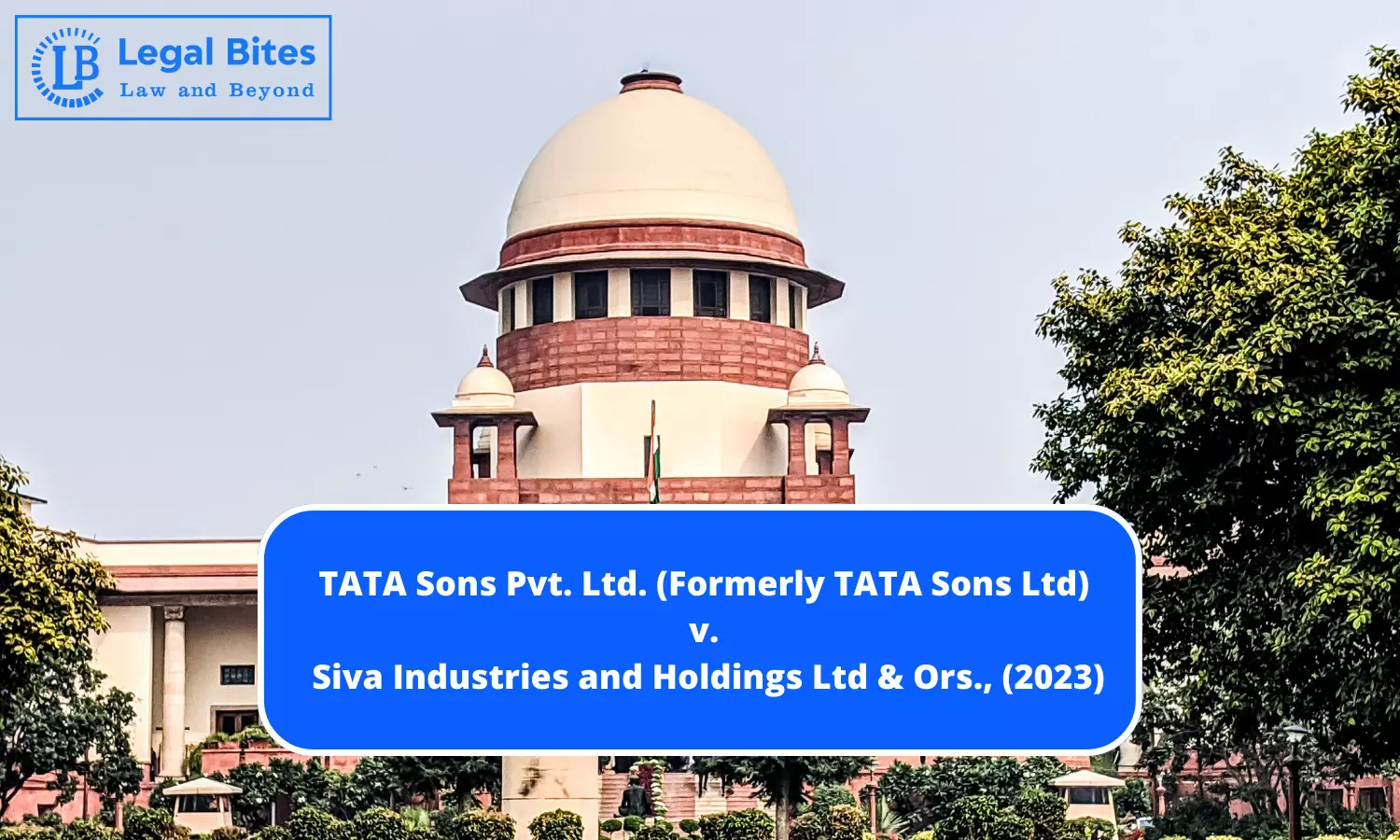Case Summary: TATA Sons Pvt. Ltd. (Formerly TATA Sons Ltd) v. Siva Industries and Holdings Ltd & Ors., (2023)
The Case Summary: TATA Sons Pvt. Ltd. (Formerly TATA Sons Ltd) v. Siva Industries and Holdings Ltd & Ors., (2023) highlights the amendment of section 29A of the Arbitration and Conciliation Act.

The Case Summary: TATA Sons Pvt. Ltd. (Formerly TATA Sons Ltd) v. Siva Industries and Holdings Ltd & Ors., (2023) by Tanmay Mehra highlights the amendment of section 29A of the Arbitration and Conciliation Act. It also deals with the matter of International Commercial Arbitration jurisdiction under the aforesaid Act. According to Section 29A of the (Amendment Act), an arbitral tribunal must issue an arbitral award within twelve months of the day it was established, with the...
The Case Summary: TATA Sons Pvt. Ltd. (Formerly TATA Sons Ltd) v. Siva Industries and Holdings Ltd & Ors., (2023) by Tanmay Mehra highlights the amendment of section 29A of the Arbitration and Conciliation Act. It also deals with the matter of International Commercial Arbitration jurisdiction under the aforesaid Act. According to Section 29A of the (Amendment Act), an arbitral tribunal must issue an arbitral award within twelve months of the day it was established, with the parties having the option of agreeing to an additional extension of up to six months. Regarding the International Commercial Arbitration, Hon’ble Supreme Court observes it is not bound by the time limit of twelve months given under Section 29A of the Act.
Court: Supreme Court of India
Citation: Miscellaneous Application No 2680 of 2019 in Arbitration Case (Civil) No 38 of 2017
Date of Judgment: 5th January 2023
Bench: Dr Dhanajaya Y Chandrachud, CJI, Justice P S Narasimha
Facts of the Case
In the present case, Tata Sons Pvt Ltd Company is an applicant. There are two respondents in this case first is Siva Industries and Holdings Ltd, and the second company is the promoter of Siva Industries, C Sivasankaran residing in Seychelles (East Africa). On 24th February 2006, the applicant, Siva Industries and Tata Tele Services Ltd, which is the subsidiary company of Tata sons, executed a share subscription agreement. As per the terms and conditions are given under the agreement, TTSL allots the share to the first respondent.
Afterwards, the agreement has been signed between NTT Docomo Inc and Tata Sons and TTSL on 12th November 2008, where the Docomo Company acquires 26% of the Company share in a combination of primary shares (issued by TTSL) and secondary shares (Share held by the Siva industries). On 3rd March 2009, Docomo acquired a 20.740 million equity share of TTSL from Siva Industries and signed an agreement between the applicant, TTSL and Docomo. The agreement has been signed between the applicant, TTSL and the respondent, obliged the respondents to purchase the TTSL shares on a pro-rata basis in the event Docomo exercised its sale option under the Shareholders’ Agreement. Under clause 5.7 of the Shareholders’ Agreement, Docomo invoke the sale option and addressed a sale notice to the Tata sons Company on 7th July 2014.
Disputes having arisen between the applicant and Docomo As per the London Council for International Arbitration's Rules, Docomo initiated arbitration proceedings against the applicant. A tribunal issued its decision on June 22, 2016, and as a result, the applicant was required to pay Docomo and buy the TTSL shares that Docomo had offered. The applicant called the first respondent to proportionally pay for a share of TTCL and acquire back its shareholdings in TTCL from Docomo under inter se agreement. Tata sons issued a notice of arbitration to both respondents under Clause 10 of the inter se agreement.
Issue and Contention in this Case
I. Issue: Whether Section 29 A (1) of the Arbitration and Conciliation Act, 2015 applies to International Commercial Arbitration?
II. Contention: The contention by the applicant is that as per the amendment of Section 29A of the Act, the arbitration proceedings before the sole arbitrator should be allowed to continue automatically, given the amendment of the statute.
Laws Applied
I. Section 29 A of the Arbitration and Conciliation Act
The arbitrator must provide the arbitral award within twelve months, according to Section 29A(1). The substantive aspect of Section 29A(1) makes it clear that the twelve-month timeline is not required for international commercial arbitration. As a result, after the amendment, only domestic arbitrations are subject to the twelve-month time limit outlined in Section 29A. The twelve-month period is the only directory in nature for international commercial arbitration.
II. Section 29 A (1) of the Arbitration and Conciliation Act
It should apply to all existing arbitration cases as of the effective date (i.e. 30 August 2019), as Section 29A(1), as amended, is remedial. The amendment is corrective in that it exempts international commercial arbitrations from the strict application of the six-month deadline.
Argument by the Parties
Arguments by the Applicant:
As a result of Section 29A's amendment, international commercial arbitration is no longer subject to the 12-month deadline for issuing an award following the completion of the pleadings. Therefore, the applicant contended that, as the revision was procedural, it would apply to the arbitral proceedings in the current case when Justice S N Variava was appointed on January 17, following the arbitrator entering upon the reference on February 14.
The applicant has argued that the solo arbitrator may be given additional time to finish the arbitration proceedings if this Court were to rule that the revised provisions of Section 29A do not apply to the current arbitration.
Arguments by the Respondent:
According to the second respondent, the modification to Section 29A would not imply that the clause does not cover international commercial arbitration. It said that interpreting Section 29A's provisions the way the applicant does would lead to a scenario in which there would be no deadline outlined in the statute for international commercial arbitration.
The provisions of sub-section (3) and sub-section (4) must also apply to international commercial arbitration. The legislature has not expressly excluded the applicability of sub-section (3) and (4) of Section 29A to international commercial arbitration.
Judgment
The bench of CJI D Y Chandrachud and Justice P S Narasimha observed that the time limit provided under Section 29A of the Act (i.e. 12 months) is not applicable to the International Commercial Arbitration. After the amendment in 2015, in international commercial arbitrations, the tribunal can make an endeavour to complete the proceedings within twelve months from the date of competition of pleadings and are not bound to abide by the time limit prescribed for domestic arbitrations.”
The court mentioned the case of Shapoorji Pallonji & Co. Pvt. Ltd. v. Jindal India Thermal Power Ltd. and stated that “the removal of the mandatory time limit for making an arbitral award in the case of an international commercial arbitration does not confer any rights or liabilities on any party.”
Section 29A (1) (after amendment) is remedial in nature, and that’s way applicable to all pending proceedings (from 30th August 2019). As per the amended Section 29A requirements, the sole arbitrator, in this case, would be operating within his authority and jurisdiction to decide upon any further extension of time beyond what was originally stipulated at the meeting, which was held on 21 March 2018. The sole arbitrator may give the proper procedural instructions for a time extension while still attempting to bring the arbitration to a quick conclusion.
Important Links
Law Library: Notes and Study Material for LLB, LLM, Judiciary, and Entrance Exams

Tanmay Mehra
Tanmay Mehra is a law graduate with a Bachelor's in Business Administration and Law (B.B.A.LL.B.) from National Law University Odisha, Cuttack. Currently, she is aspiring to crack the Judicial Service examination.
